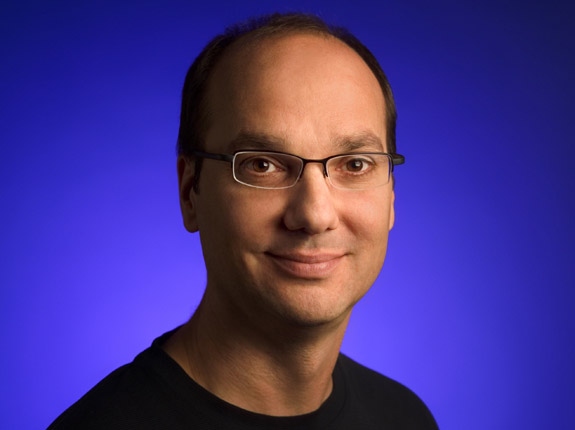Andy Rubin Stepping Down as Android Head
Sundar Pichai is taking over Android.
Google CEO Larry Page updated the official Google Blog reporting that Android boss Andy Rubin is stepping down from his role. Sundar Pichai, the head of Google's Chrome division which includes the web browser and operating system, will take his place. The news arrives as Android not only continues to dominate the smartphone market, but lead the tablet market for the first time in 2013.
"Sergey and I first heard about Android back in 2004, when Andy Rubin came to visit us at Google," Page said. "He believed that aligning standards around an open-source operating system would drive innovation across the mobile industry. Most people thought he was nuts. But his insight immediately struck a chord."
Rubin joined Google back in 2005 and was tasked to turn his open-source mobile OS into a full-fledged Apple iOS rival. Those very open-source roots have helped propel the platform to its current stardom, offered up for free to manufacturers who in turn can customize the platform to fill their needs. And unlike Apple's closed network, Android is open to all creative minds.
"The pace of innovation has never been greater, and Android is the most used mobile operating system in the world: we have a global partnership of over 60 manufacturers; more than 750 million devices have been activated globally; and 25 billion apps have now been downloaded from Google Play," Page said. "Pretty extraordinary progress for a decade’s work."
With Android now dominating both the smartphone and tablet market, Andy has decided it’s time to hand over the reins and "start a new chapter" at Google -- so far it's unknown what that "new chapter" will be. Meanwhile, Sundar Pichai will lead Android in addition to his existing work with Chrome and Apps.
"Today Chrome has hundreds of millions of happy users and is growing fast thanks to its speed, simplicity and security," he said. "So while Andy’s a really hard act to follow, I know Sundar will do a tremendous job doubling down on Android as we work to push the ecosystem forward."
The news is interesting given all the previous talk about merging Chrome OS with Android. While the company has stated in the past that mobile and desktop should be completely different, evidence of merging Android and Chrome OS has been spotted in the Chromium code. A single OS could be cheaper to manage, and would provide a more consistent experience across different form factors.
Get Tom's Hardware's best news and in-depth reviews, straight to your inbox.
"We’re getting closer to a world where technology takes care of the hard work—discovery, organization, communication—so that you can get on with what makes you happiest… living and loving," he said. "It’s an exciting time to be at Google."

Kevin Parrish has over a decade of experience as a writer, editor, and product tester. His work focused on computer hardware, networking equipment, smartphones, tablets, gaming consoles, and other internet-connected devices. His work has appeared in Tom's Hardware, Tom's Guide, Maximum PC, Digital Trends, Android Authority, How-To Geek, Lifewire, and others.
-
dalethepcman With all the awesome Innovation coming from Google, (glass, self driving cars, android, chrome, docs, gmail, let alone search) one wonders why they weren't the most valuable company in the world a few months back over a fruit company with all their products based around a single point of failure (itunes)Reply -
aicom dalethepcmanWith all the awesome Innovation coming from Google, (glass, self driving cars, android, chrome, docs, gmail, let alone search) one wonders why they weren't the most valuable company in the world a few months back over a fruit company with all their products based around a single point of failure (itunes)Reply
Because the stock market doesn't care how awesome your innovation is. All they see is $$$ in profit. That's why it's an oil company sitting on top now (take your pick of tech companies; I'll bet most/all of them are innovating more than Exxon)
-
Vettedude aicomBecause the stock market doesn't care how awesome your innovation is. All they see is $$$ in profit. That's why it's an oil company sitting on top now (take your pick of tech companies; I'll bet most/all of them are innovating more than Exxon)Tech companies are a lot more volatile. Any of their innovations can flop, but the world runs on oil. That's the reason Exxon is #1. They are a rock solid company. Kinda like Philip Morris, nothing like an addicted user base to feed you consistent profits.Reply -
STravis dalethepcmanWith all the awesome Innovation coming from Google, (glass, self driving cars, android, chrome, docs, gmail, let alone search) one wonders why they weren't the most valuable company in the world a few months back over a fruit company with all their products based around a single point of failure (itunes)Reply
They still aren't. -
jeremyaaron6 just before I saw the draft that said 5949, I have faith ...that...my cousin had been realy erning money part-time at their laptop.. there dads buddy has been doing this 4 less than a year and a short time ago paid for the depts on there house and bought Mercedes-Benz S-class. we looked here, http://www.pie21.comReply
